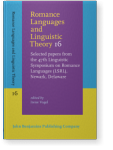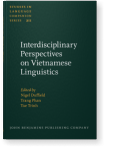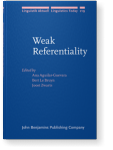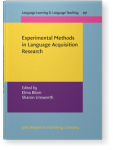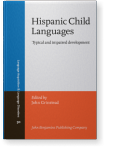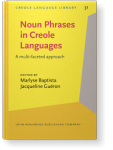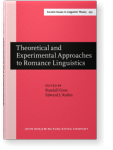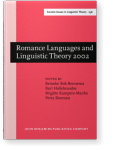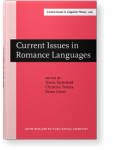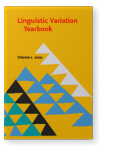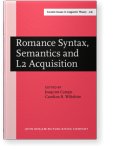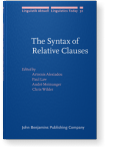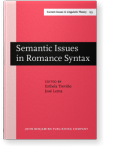Cristina Schmitt
List of John Benjamins publications for which Cristina Schmitt plays a role.
Book series
2019 Chapter 10. Vietnamese children’s interpretation of definite noun phrases Interdisciplinary Perspectives on Vietnamese Linguistics, Duffield, Nigel, Trang Phan and Tue Trinh (eds.), pp. 215–240 | Chapter
Most work on the acquisition of definiteness examines languages with definite determiners and grammaticalised number, and finds slower acquisition of definiteness compared to number. We replicate an act-out task from Munn et al. (2006) testing comprehension of definites in Vietnamese – a language… read more
2014 Predicate nominals in Papiamentu: a comparison with Brazilian Portuguese and other languages Weak Referentiality, Aguilar-Guevara, Ana, Bert Le Bruyn and Joost Zwarts (eds.), pp. 129–156 | Article
This paper presents a comparative analysis of number in predicate nominals in Papiamentu and Brazilian Portuguese. While Papiamentu predicate nominals do not show plural agreement when the subject is plural, Brazilian Portuguese shows agreement in spite of the fact that both languages allow number… read more
2010 Chapter 2. Using comprehension methods in language acquisition research Experimental Methods in Language Acquisition Research, Blom, Elma and Sharon Unsworth (eds.), pp. 35–56 | Chapter
2009 Syllable-final /s/ lenition and the acquisition of plural morphology in Spanish-speaking children Hispanic Child Languages: Typical and impaired development, Grinstead, John (ed.), pp. 3–28 | Article
This paper examines the effect of syllable-final /s/ lenition on the production and comprehension of plural marking in Spanish-speaking children. Two varieties of Spanish were examined. The first variety is Chilean Spanish where final /s/ undergoes a process of lenition and is sometimes omitted in… read more
2007 4. Papiamentu and Brazilian Portuguese: A comparative study of bare nominals Noun Phrases in Creole Languages: A multi-faceted approach, Baptista, Marlyse and Jacqueline Guéron (eds.), pp. 107–143 | Chapter
This paper presents a comparative study on bare nominals in Papiamentu and Brazilian Portuguese, taking into account also the distribution of definite and indefinite articles in these languages. Following Munn and Schmitt (2001) and Schmitt and Munn (1999 , 2003), we argue bare singulars in both… read more
2005 Bare nominals in Papiamentu and Brazilian Portuguese: an Exo-skeletal Approach Theoretical and Experimental Approaches to Romance Linguistics: Selected papers from the 34th Linguistic Symposium on Romance Languages (LSRL), Salt Lake City, March 2004, Gess, Randall and Edward J. Rubin (eds.), pp. 237–256 | Article
2004 The Development of Inalienable Possession in English and Spanish Romance Languages and Linguistic Theory 2002: Selected papers from ‘Going Romance’, Groningen, 28–30 November 2002, Bok-Bennema, Reineke, Bart Hollebrandse, Brigitte Kampers-Manhe and Petra Sleeman (eds.), pp. 199–216 | Article
2002 Bare nouns and the morphosyntax of number Current Issues in Romance Languages: Selected papers from the 29th Linguistic Symposium on Romance Languages (LSRL), Ann Arbor, 8–11 April 1999, Satterfield, Teresa, Christina Tortora and Diana Cresti (eds.), pp. 225–239 | Article
2002 The syntax and semantics of bare arguments in Brazilian Portuguese Linguistic Variation Yearbook 2002, Pica, Pierre (ed.), pp. 185–216 | Article
2001 Syntactic Constraints on Access to Lexical Structure: The case of ficar Romance Syntax, Semantics and L2 Acquisition: Selected papers from the 30th Linguistic Symposium on Romance Languages, Gainesville, Florida, February 2000, Camps, Joaquim and Caroline R. Wiltshire (eds.), pp. 211–226 | Article
2000 Some Consequences of the Complement Analysis for Relative Clauses, Demonstratives and the Wrong
Adjectives The Syntax of Relative Clauses, Alexiadou, Artemis, Paul Law, André Meinunger and Chris Wilder (eds.), pp. 309–348 | Article
1999 Determiner transparency: Evidence from Brazilian Portuguese Semantic Issues in Romance Syntax, Treviño, Esthela and José Lema (eds.), pp. 263–282 | Article
